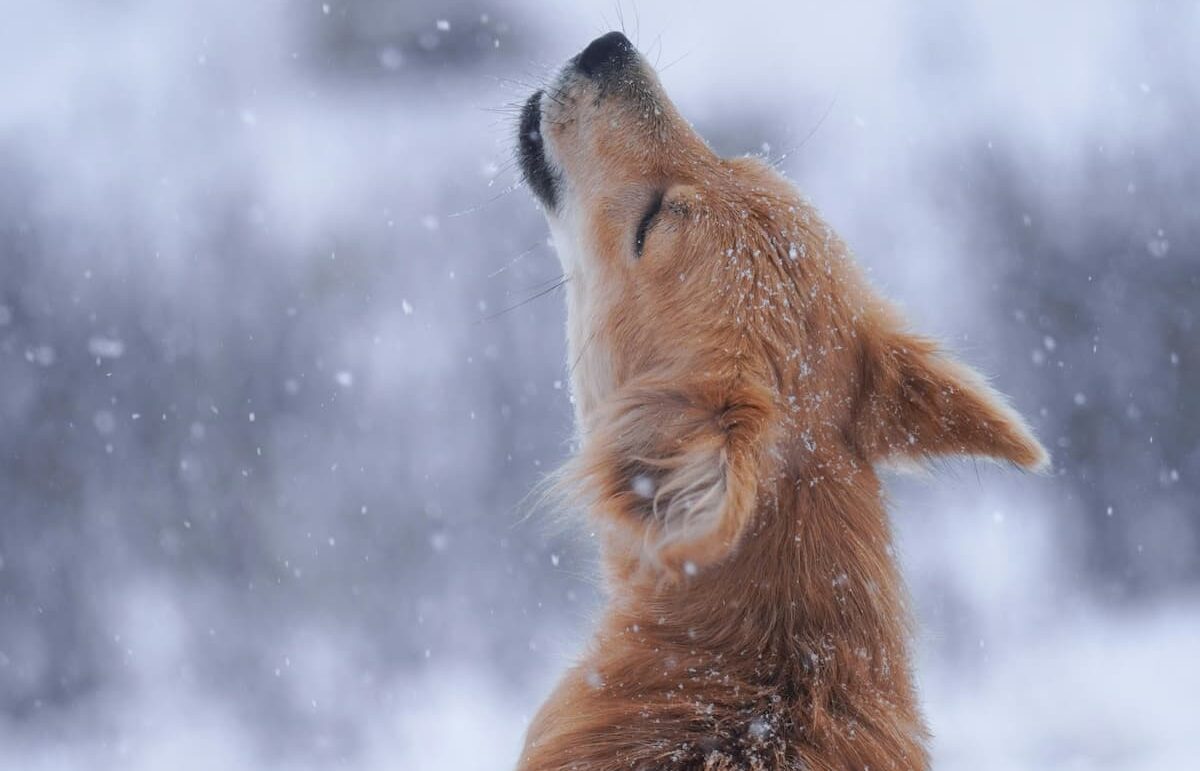Just like their wolf ancestors, dogs will often howl in the middle of the night.
But what exactly is the purpose behind this behavior?
Read on to find out.
Understanding the Behavioral Reasons Behind Dog’s Howl
Dogs have a unique way of expressing themselves, and one of their most distinctive forms of communication is howling.
Have you ever wondered why dogs howl?
Well, there are various behavioral reasons behind this distinct vocalization that can help us better understand our furry friends.
1. Social Bonding
- Howling can serve as a way for dogs to establish and reinforce social bonds within their pack or family.
- By howling together, dogs can synchronize their vocalizations and create a sense of unity and togetherness.
- It helps them communicate their presence and strengthen their bond with their human or canine companions.
2. Communication
- Dogs howl to communicate with one another over long distances.
- They may be trying to gather their pack, signal their location, or alert others to potential dangers.
- Furthermore, howling can sometimes be triggered by sounds such as sirens, which the dog interprets as communication from another being.
3. Emotional Expression
- Dogs may also howl to express their emotions, such as loneliness, anxiety, or even excitement.
- Lonely dogs, for instance, may howl to seek companionship or draw attention to their isolation.
- Similarly, anxious or excited dogs may release their pent-up energy by enthusiastically howling.
- Understanding the emotional context can help us respond appropriately and provide the necessary support and comfort to our furry companions.
4. Inherited from Ancestry
- Dogs’ howling instinct can be traced back to their ancestors, the wolves.
- Wolves are well-known for their spine-chilling howls that can be heard over long distances.
- For them, howling is crucial for communication within their pack, helping them coordinate activities, call others together, and even maintain social bonds.
- Over the course of evolution, dogs have retained this instinctive behavior, making it a part of their genetic makeup.
Learn About the Different Triggers for Howling in Dogs
From eerie echoes to heartwarming serenades, the reasons behind a dog’s howling can be as diverse as their personalities.
Understanding these triggers can deepen our bond with our furry friends and help us address their needs:
Seeking Attention
Dogs are masters at capturing our attention, and sometimes howling is their way of saying, “Hey, I’m here!”
Whether they want to go for a walk, get some playtime, or simply crave our presence, howling can be their go-to method to seek our undivided attention.
It’s important to address their needs and give them the love and engagement they desire.
Tip: Teaching your dog alternative ways to communicate, such as using a gentle pawing or waiting silently by your side, can help them express themselves without the need for howling.
Separation Anxiety
Dogs are pack animals at heart, and being left alone can trigger feelings of distress and separation anxiety.
When our furry companions are uncomfortable with being separated from us or other members of their pack, they may express their anxiety through howling.
They’re essentially calling out, hoping that their pack will return to them.
This behavior can be distressing for both the dog and their human family.
Tip: Gradually accustoming your dog to periods of alone time, using positive reinforcement, and ensuring they have plenty of engaging toys can help alleviate separation anxiety and reduce howling episodes.
Environmental Triggers
Dogs possess keen senses, with hearing being one of their superpowers.
Their acute hearing allows them to pick up on distant sounds that we may not even notice.
From sirens wailing, distant animal howls, or even loud music, these environmental triggers can incite our pets to join in the chorus.
Their howling might be their way of joining in or, in some cases, aiming to alert us to the “intruder” they have detected in the distance.
Tip: Engaging your dog in mentally stimulating activities, such as puzzle toys or training exercises, can redirect their attention and help minimize howling triggered by external noises.
By decoding the various sources of howling, we can better understand our furry friends’ needs and cultivate a harmonious living environment.
Remember, every dog is unique, so what triggers one dog’s howling may not have the same effect on another.
Through patience, empathy, and positive reinforcement, we can help our dogs express themselves in healthier ways, strengthening the bond between us and our beloved four-legged companions.
Tips and Techniques for Reducing Howling Behavior
It’s important to note that howling in dogs is a natural instinct, as they’re descendants of wolves who use howling as a means of communication.
However, excessive or persistent howling can be a sign of distress or boredom.
To help calm your furry friend and maintain a peaceful environment in your home, try these practical tips and techniques:
1. Create a soothing environment: Dogs are sensitive to their surroundings, so creating a calming atmosphere can work wonders.
Provide a comfortable and quiet space for your dog, complete with their bed, toys, and a blanket with your scent.
Consider using white noise machines or calming music specifically designed for dogs to drown out external sounds that may trigger howling.
2. Establish a consistent routine: Dogs thrive on routine, and having a well-established schedule can help reduce anxiety-related howling.
Set regular feeding, exercise, and playtime schedules, ensuring your dog receives ample mental and physical stimulation throughout the day.
A tired dog is less likely to howl out of boredom or pent-up energy.
3. Address separation anxiety: Separation anxiety is a common trigger for howling in dogs.
Gradual desensitization techniques can help your furry companion feel more comfortable when you’re away.
Start by leaving your dog alone for short periods and gradually increase the duration over time.
You can also try leaving them with interactive toys or treats to distract and occupy their attention.
4. Alleviate boredom: Mental stimulation is also crucial in minimizing howling episodes.
Just like humans, dogs can get bored, and howling might be their way of expressing frustration.
To combat this, engage your furry friend in mentally stimulating activities such as puzzle toys or treat-dispensing games.
These will keep their minds occupied and help alleviate any pent-up energy that may be triggering their howling.
Additionally, regular exercise and playtime can go a long way in keeping your dog physically and mentally stimulated.
Remember, every dog is unique, and what works for one may not work for another.
Patience, consistency, and positive reinforcement are key when it comes to reducing howling behavior.
By utilizing these tips and techniques, you’ll be well on your way to establishing a calmer and happier environment for both you and your four-legged friend.
Essential Training to Reduce Excessive Howling
Proper training plays a crucial role in preventing excessive howling.
By teaching your dog basic commands, such as “quiet” or “speak,” you can control their vocalizations and redirect their behavior when necessary.
Consistency is key here: reinforcing these commands through positive reinforcement and rewards will help your dog understand what is expected of them.
When your dog learns to communicate with you in a more subdued manner, you can say goodbye to incessant howling and enjoy a quieter household.
Socialization is equally important when it comes to curbing excessive howling.
Dogs are social animals and need regular interaction with other dogs and humans to feel secure and well-adjusted.
Introducing your furry friend to different people, places, and experiences from an early age can greatly reduce anxiety-induced howling.
Gradually exposing them to new situations and helping them build positive associations will boost their confidence and reduce the likelihood of excessive vocalization when faced with the unfamiliar.
To further assist your dog in overcoming their howling tendencies, incorporate these tips into your training routine:
-
- Ensure your dog gets plenty of physical and mental exercise to alleviate restlessness and boredom, which may trigger excessive howling.
-
- Use positive reinforcement techniques, rewarding your pup for calm and quiet behavior, and avoiding punishment or yelling, which can exacerbate anxiety.
-
- Consider seeking professional help from a dog trainer or behaviorist if your dog’s excessive howling persists despite your best efforts.
Remember, every dog is unique, and their howling behavior can vary.
By patiently training, providing them with proper socialization, and addressing any underlying issues, you can effectively minimize excessive howling and create a peaceful and delightful canine-human companionship.
FAQ
Q: Why do dogs howl?
A: Great question!
Dogs howl for various reasons, and it’s quite intriguing.
Firstly, howling is an ancestral behavior that dates back to their wolf ancestors.
These wild canines used howling to communicate with their pack members over long distances.
So, it’s like a furry version of long-distance calling!
Q: Can you give some examples of these reasons?
A: Absolutely!
Dogs often howl when they feel separation anxiety because they miss their human companion or the warm company of their doggie pals.
It’s their way of vocalizing their emotions, sort of like saying, “Hey, where are you?”
Q: That makes sense.
What else triggers a dog’s howling?
A: Well, sometimes dogs howl in response to specific sounds, like sirens, music, or even singing.
These unique melodies evoke their natural instincts, triggering a response that closely resembles a musical duet with the source of the sound.
So, next time you hear a dog howling along with a tune, think of it as a pawsome collaboration!
Q: Are there any other reasons dogs may howl?
A: Absolutely!
Dogs also howl to express their territorial instincts.
When they hear an unfamiliar dog’s howl nearby, they may respond by joining in to protect their turf.
After all, they want to make sure their little patch of the neighborhood is safe and secure.
Q: Can humans contribute to a dog’s howling habits?
A: Indeed!
Human behavior can sometimes play a role as well.
For instance, if a dog howls and receives attention (even if it’s due to annoyance), they might interpret it as positive reinforcement.
So, remember to avoid inadvertently encouraging your furry friend’s howling if you don’t want it to become a habit.
Q: Is there anything we can do to help a howling dog?
A: Absolutely!
If your dog tends to howl excessively, it’s important to understand the underlying cause.
Address any potential separation anxiety by gradually desensitizing your pup to your comings and goings.
Providing them with plenty of mental and physical stimulation can also help reduce howling.
And, of course, loads of love, patience, and understanding will go a long way in creating a harmonious environment for man and dog.
Q: Can all dog breeds howl, or are some more prone to it?
A: Generally, all dogs are capable of howling, as it’s deeply ingrained in their DNA.
However, certain dog breeds, like Huskies and Alaskan Malamutes, have retained more of their wolfish qualities and are known for their howling abilities.
So, if you’re looking for a melodious companion, these breeds might be right up your alley!
Last Words
From pawsome pack coordination to expressing emotions and summoning their humans, dogs certainly have a lot to say and howling is just one of the many intriguing ways they do it.
Next time you find your furry companion belting out a melodious howl or joining in the neighborhood chorus, you’ll understand that there’s more to it than meets the ear.
Perhaps they’re simply expressing their inner wolf or sending out important messages to their four-legged comrades nearby.
Remember, as humans, we might never fully grasp the depth and complexity of doggy language, but it never hurts to appreciate their unique abilities.














